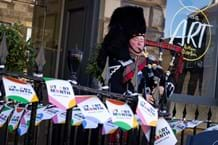There has been speculation that the show was under pressure to follow its 'sister' programme in the USA and drop most ivory appraisals from the show.
Executive producer Simon Shaw told ATG that the show had become increasingly cautious about bringing pieces of ivory to camera, which has resulted in a decline in such appearances on Antiques Roadshow. The approach has been taken in association with the team of specialists who have debated the issue at length.
However, Mr Shaw believes the Roadshow has an important role to play as viewers look for more information on the subject. "In our role as a trusted source of advice about antiques and fine art, we do not feel it appropriate to impose a ban on all coverage of ivory objects.
"On the few occasions where we will show antique ivory in future programmes we will choose them because of their importance in representing such cultural or creative significance and only when such pieces are legal under the CITES convention. Within these features we will also seek to reflect the wider context of the debate about ivory and the horrors of modern day poaching."
Mr Shaw said they had already filmed a discussion of the issues around the ownership of antique ivory that includes contributions from Will Travers, from the wildlife charity Born Free, and Dr Marjorie Trusted, author of the Victoria and Albert Museum's catalogue of Baroque & Later Ivories. This will be shown as part of the new series of Antiques Roadshow in the autumn.
'Problematic Objects'
The statement follows the news that the Public Broadcasting Service, makers of the US version of the Roadshow, will be dropping some ivory appraisals from the show. Tusk carvings in particular won't be shown in new episodes or in segments drawn from previously aired shows.
It is unclear if the BBC programme (and its extensive series archive) will be similarly edited to remove 'problematic' objects prior to viewing in the US or other overseas markets where the show has a large following.
PBS recently faced criticism from The Wildlife Conservation Society (WCS) who believe monetising pre-convention ivory perpetuates the demand for illegal modern ivory carvings.
Earlier this year, against a background of changing federal and state legislation, WCS launched a campaign to influence the content of the PBS show. It issued a statement describing the June 4 decision as an important step in ensuring elephant ivory "is not glorified on air".
John Calvelli of the WCS added: "All ivory, whether it's centuries old or days old, comes from a dead elephant. When Antiques Roadshow appraises ivory on air, it sends the message that selling ivory is perfectly okay and also highly lucrative."
PBS will, however, continue to show antiques with elephant ivory elements, such as portrait miniatures or musical instruments, when viewers will be informed about the historical and cultural significance of such objects and what PBS called "the larger issues at hand".





